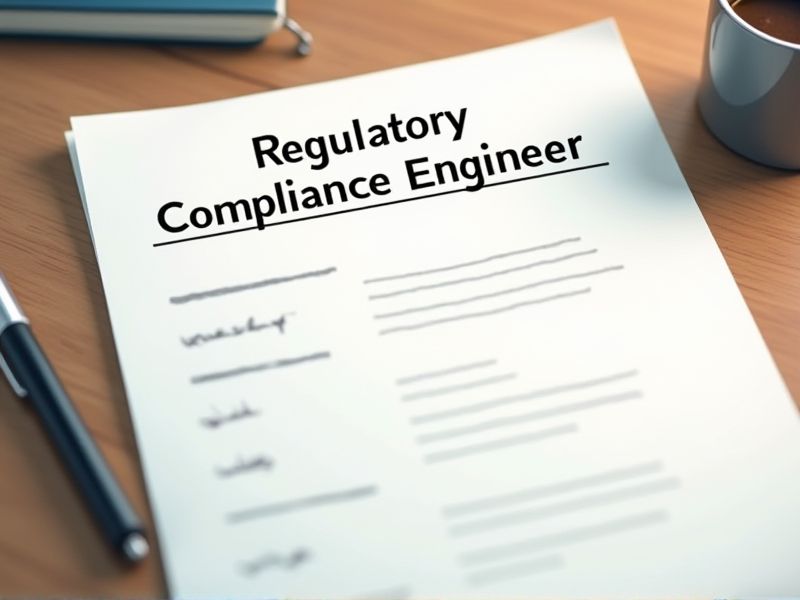
Regulatory Compliance Engineers play a crucial role in ensuring that products and processes align with legal and industry standards, impacting the safety and efficacy of outcomes. Certifications validate their expertise in navigating complex regulations and demonstrate their ability to mitigate risks associated with non-compliance. Given the evolving landscape of industry standards, certain certifications enhance the engineer's ability to interpret and apply regulations effectively. Here are some key certifications that can benefit a Regulatory Compliance Engineer.
Certified Regulatory Compliance Manager (CRCM)
The CRCM credential provides a thorough understanding of regulations, enhancing the ability of a Regulatory Compliance Engineer to navigate complex legal frameworks. Possessing a CRCM demonstrates a commitment to maintaining industry standards, which can lead to improved trust from stakeholders. This certification equips engineers with updated insights on compliance measures, enabling them to implement effective systems in evolving regulatory landscapes. Organizations often seek professionals with CRCM due to the rigorous training behind the certification, ensuring alignment with best practices in compliance management.
Certified Compliance & Ethics Professional (CCEP)
Regulatory Compliance Engineers often face complex and evolving laws and regulations, making the knowledge of a Certified Compliance & Ethics Professional (CCEP) crucial to navigating these challenges effectively. The CCEP certification equips engineers with the necessary skills to implement compliance programs and ensure adherence to legal and ethical standards. As industry-specific regulations become more stringent, a CCEP credential provides a competitive edge by demonstrating a commitment to maintaining regulatory integrity. Employers value certified professionals who can proactively manage compliance risks and develop strategies to mitigate potential legal and ethical breaches.
ISO 9001 Lead Auditor Certification
Obtaining an ISO 9001 Lead Auditor Certification equips a Regulatory Compliance Engineer with the skills to conduct thorough quality management system audits, ensuring adherence to best practices. This certification enhances an engineer's ability to identify areas of non-compliance and implement corrective actions, which is crucial for maintaining industry standards. It underscores the engineer's commitment to quality assurance, thereby reinforcing an organization's credibility with regulatory bodies. The certification ensures that the engineer is proficient in risk management and continuous improvement initiatives, essential for regulatory compliance.
ISO 13485 Lead Auditor Certification
ISO 13485 Lead Auditor Certification equips a Regulatory Compliance Engineer with skills to assess and ensure compliance with medical device quality management systems. This certification provides a standardized framework to identify and address non-conformities in manufacturing processes. Possessing this certification enhances credibility and trust with regulatory bodies, facilitating smoother audits and approvals. Knowledge gained from this certification ensures that devices meet stringent international quality and safety standards, mitigating risks of recalls or regulatory penalties.
Certified Quality Engineer (CQE)
Regulatory Compliance Engineers must ensure products meet industry standards, and a Certified Quality Engineer (CQE) offers expertise in quality systems and methodologies that strengthen compliance processes. The CQE certification equips professionals with knowledge in process improvement and statistical techniques that are crucial for achieving and maintaining compliance. Companies face significant financial and reputational risks if they fail to comply with regulations, so a CQE's skills can proactively mitigate these risks. Having a CQE on the compliance team often leads to enhanced product quality, which aligns with regulatory requirements and customer expectations.
Certified Quality Auditor (CQA)
A Certified Quality Auditor (CQA) equips a Regulatory Compliance Engineer with the expertise necessary to conduct thorough and systematic audits, ensuring that quality systems meet regulatory standards. The credential signifies in-depth knowledge of relevant compliance requirements and best practices, which is essential for identifying and mitigating potential compliance risks. CQAs are trained to evaluate quality systems critically, which enhances the engineer's ability to ensure products and processes consistently adhere to regulations. Their skill set enables improved documentation and reporting compliance, which is crucial for meeting regulatory obligations and avoiding legal penalties.
Six Sigma Black Belt Certification
A Six Sigma Black Belt Certification enhances a regulatory compliance engineer's ability to identify inefficiencies in compliance processes. The certification equips engineers with advanced problem-solving skills and data analysis techniques, crucial for maintaining stringent industry regulations. With these skills, engineers can proactively manage risks and ensure compliance standards are consistently met. Organizations benefit by minimizing compliance-related penalties and improving overall operational efficiency.
Project Management Professional (PMP)
Obtaining a PMP certification equips a Regulatory Compliance Engineer with essential project management skills, ensuring adherence to regulatory standards. This certification enhances an engineer's ability to manage timelines and resources effectively, reducing compliance risks. PMP training also fosters better communication skills, which are crucial for coordinating with various stakeholders in regulatory environments. The structured approach learned through PMP aids in maintaining robust documentation, a critical aspect of regulatory compliance.
Certified Safety Professional (CSP)
Regulatory Compliance Engineers design products and manage operations within legal and safety standards, and a CSP ensures they possess advanced knowledge of safety protocols. The CSP credential provides credibility and demonstrates a commitment to minimizing workplace hazards, thus avoiding potential fines or shutdowns due to non-compliance. It equips engineers with the ability to identify and mitigate risks, enhancing workplace safety and aligning with regulatory requirements. The extensive training and ethical frameworks embedded in CSP certification support engineers in maintaining industry standards and influencing safer organizational practices.
Lean Six Sigma Green Belt Certification
Lean Six Sigma Green Belt Certification arms a Regulatory Compliance Engineer with process optimization skills, which raises compliance efficiency standards. Enhanced data analysis capabilities from this certification enable more precise identification of compliance-related issues, leading to quicker resolutions. Understanding of waste reduction methods aligns with regulatory requirements by ensuring resource-efficient operations. Incorporating Lean principles facilitates continuous improvement, ensuring sustained adherence to evolving regulations.
Summary
By obtaining certifications, you can enhance your expertise in regulatory standards and demonstrate your commitment to maintaining industry compliance. This certification boosts your credibility, increasing your value to employers and clients. With improved skills, you can expect better problem-solving abilities in complex regulatory environments. Ultimately, career advancement opportunities likely improve, given your verified proficiency.
